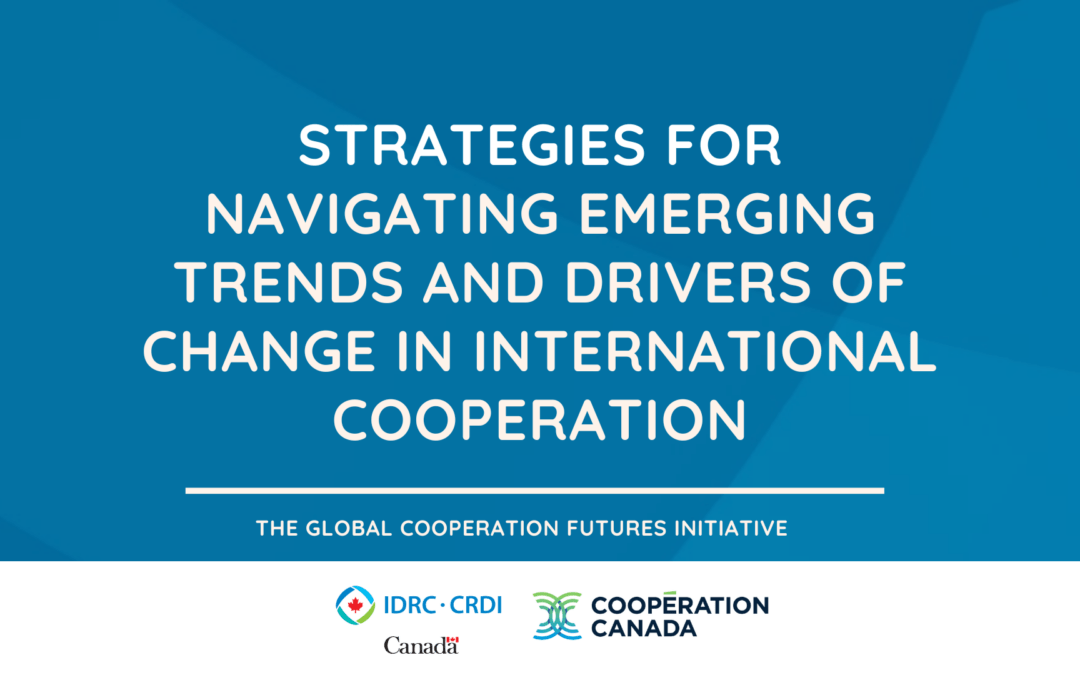The outlook for international cooperation actors for the coming decade is both uncertain and turbulent. That is the conviction behind our newly launched Landscape Analysis of the International Cooperation Sector, a scan of emerging trends and drivers of change, and an output of Cooperation Canada’s Futures Initiative. The Report links emerging trends and challenges with direct implications for international cooperation actors.
Rather than feeling overwhelmed by those implications, Civil Society organizations (CSOs) can equip themselves to effectively navigate this increasingly volatile environment and adopt innovative strategies that not only address emerging trends but also empower them to prepare for a range of plausible futures. Let’s explore four key strategies a Civil Society organization (CSO) can use to navigate uncertainty.
Strategic Foresight
Strategic foresight is a systematic approach to exploring alternative futures, anticipating potential challenges, and identifying strategic opportunities for action. Unlike traditional planning methods, which often rely on past trends and linear projections, strategic foresight embraces uncertainty and complexity, empowering organizations to navigate ambiguity and make informed decisions in the face of uncertainty. In another blog, I dive deeper into the importance of strategic foresight for CSOs, click here to read more.
Integrative Thinking
Integrative thinking is the ability to bridge siloes, forge links, and overcome the imperative of making unpleasant choices by mapping out and leveraging the interdependencies within and between systems for long term impact and resilience. Integrative thinkers refrain from binary choices and instead embrace the complexity of issues by synthesizing intuition, reason, and imagination. By building comprehensive models that consider various variables and causal relationships, CSOs can develop holistic approaches that engage diverse stakeholders and systems. Integrative thinking allows organizations to creatively resolve tensions and uncover opportunities that may have been overlooked. Embracing this mindset can enable CSOs to tackle multifaceted challenges with agility and effectiveness.
Impact Communication
With shrinking funding pools, CSOs must increasingly demonstrate their impact and effectively communicate their results. Merely showcasing the worthiness of a mission is no longer sufficient; donors increasingly demand evidence of tangible outcomes and social returns on their investments. CSOs need to invest in impact communication, where resonant storytelling plays a pivotal role. By sharing compelling narratives that illustrate how their work confronts inequity and drives positive change, CSOs can cut through the noise and inspire meaningful engagement from donors and stakeholders. Transparency, authenticity, and empathy are key elements of impactful storytelling that resonate with audiences and foster trust in the organization’s mission.
Diversification of Revenue Streams
In today’s ever-changing economic landscape, it’s imperative for Civil Society Organizations (CSOs) to take proactive steps in diversifying their revenue sources to bolster financial resilience. Our comprehensive landscape report underscores a growing trend among organizations, as they turn to digital currencies and explore private financing options to mitigate financial risks and drive innovation and adaptability. This strategic move towards revenue diversification gains heightened significance in the face of challenges such as the sovereign debt crisis, diminishing contributions from Official Development Assistance, and the shrinking civic space.
In conclusion, navigating the evolving landscape of international development cooperation requires CSOs to embrace innovation, resilience, and accountability. By adopting integrative thinking and foresight, diversifying revenue streams, and prioritizing impact communication, CSOs can proactively address emerging trends and drive sustainable progress in their communities. As agents of change, CSOs have the opportunity to lead by example and shape a more equitable and inclusive future for all.


